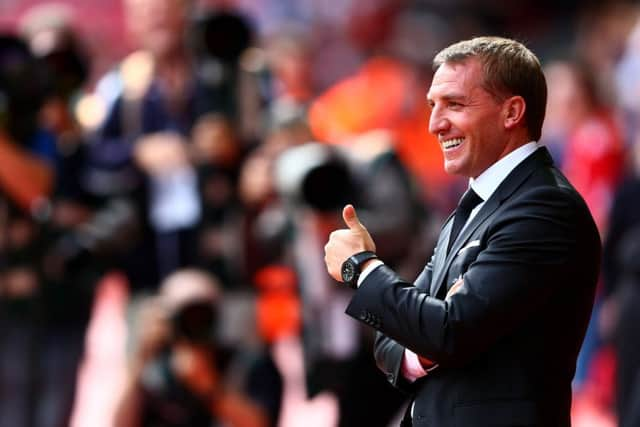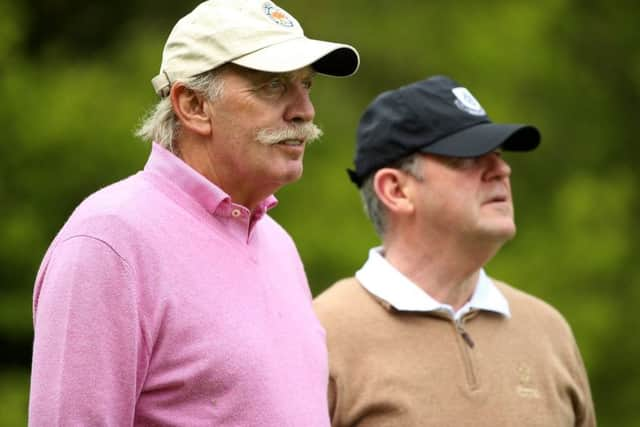How Rangers directors' antics led Celtic to Brendan Rodgers


The Irish billionaire was said to be furious that the normal etiquette rules were not respected as he sat in the vicinity of his Rangers counterparts at Hampden in the section set aside for dignitaries. Warm applause and happy smiles were cast aside for behaviour that, according to one insider, “made you think they were in the Rangers end”.
What he considered a classless display was in contrast to the classy display from the Ibrox team which confirmed that the deficiencies in the Ronny Deila set-up demanded remedial action.
Advertisement
Hide AdAdvertisement
Hide AdDesmond’s exasperation could have been, in part, a sense of feeling betrayed. Whatever a certain section of the Celtic support may believe, his fascination with his “emotional investment” of 22 years ago extends to his poring over club forums. Within these his name is mud because of an interview he gave months after Rangers were required to start again in the fourth tier following the 2012 liquidation.


In that he spoke of the Ibrox institution “as a fantastic club with a great history”, of being “disappointed” they did not share the same league set-up as Celtic, and of how he was sure it wouldn’t “be long” before they were doing so. An assessment perfectly in line with how clubs across the world that take the name and form of liquidated forbears are understood to assume the former’s lineage, it ran contrary to the Celtic supporter stance that Rangers post-2012 are a new club with no history beyond four years ago.
The respect, at reputational cost among his own supporters, then shown by the Celtic kingmaker for a great rival then suffering was, in his eyes, thrown back in his face at Hampden six weeks ago. Putting Rangers in their place became then entwined with the pursuit of “a great manager” for his own “great club”.
Desmond, in consort with chief executive Peter Lawwell, crunched the numbers and recognised that a Martin O’Neill-style appointment was doable.
Without a direct domestic competitor with even a fraction of their resources since 2012, the intention was that the club should build over the period, and that had been achieved. In addition, commercial deals overseen by Lawwell had helped afford a financial latitude.


Along with the inevitable uptake in season ticket sales, all these elements not only made it affordable to get a “box office” draw to helm the team – and in the process repair the disconnect that had opened up with the club’s following in recent years over largely joyless domestic success and Champions League failure.
With the new enthusiasm and season-ticket purchasing this would spark among the support, it would be self-sustaining – the model that Desmond prides himself on being a key strategist within.
The stars then aligned in the ability to entice Rodgers. The Irishman found the proposition intriguing from the get-go, partly owing to his background knowledge of Celtic’s reach. The concerns he had over the post were equally obvious: operating in a backwater with limited funds. Yet, with a wage package that made for a £2m-plus take home and a £15m transfer budget, Celtic could sell themselves as an English Championship style possible. Rodgers wanted to consider his options. If within those, an English Premier League team had fluttered their eyelashes then the proposition would have proved irresistible.
Advertisement
Hide AdAdvertisement
Hide AdHowever, this is an unusually settled summer as far as vacancies in English football’s land of lucre are concerned. The one notable exception is Everton… where, for all the Merseyside cross-ties, last year’s Liverpool manager is hardly a viable candidate.
Rodgers and Celtic then were made for each other in this moment. The 43-year-old had to decide, two years on from being England’s manager of the year, if he wanted to be a Championship manager or, with a fair wind behind him he is confident he can generate, a Champions League manager, a domain into which he can take Celtic but which his Anfield successor Jurgen Klopp could not claim for his old club.
The final twist in this tale belongs to Desmond. It also comes from that much-regurgitated interview of 2012. “Rangers are one of the great clubs in Britain and we have to acknowledge that,” he said. “They are a motivation for us to go along and beat them in every Old Firm match, so we miss that opportunity.”
In Rodgers, Celtic have not missed an opportunity to remind of their reach in Britain and how out of that reach they intend to remain for Rangers.